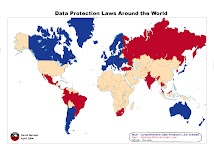Financial services firms’ recruitment drops significantly in response to the turmoil in the markets.
London, December 24th, 2008. Employment offers across financial services companies fell by 20% in November compared to the previous month. IT contractors working in financial services fell by 75% for the corresponding period, according to research carried out by Powerchex Limited, a pre-employment screening firm for financial institutions.
Investment Banks continued to cut back significantly on their new hires with a 55% drop in employment offers from October to November. Hedge funds and stock broking firms registered similar drops in offers made and accepted. Insurance firms bucked the trend with an increase of 10% in offers made in the past month.
“Recruitment is the financial sector is taking an unsurprising hit as companies are contracting in response to dramatically changing circumstances.” says Alexandra Kelly, Managing Director of Powerchex. “Applicants will need to adjust their expectation and take a more structured approach in their job search. Even though the temptation is there, applicants should not risk losing a good opportunity by exaggerating their credentials.”
Wednesday 24 December 2008
Friday 19 December 2008
FSA Signals Tougher Vetting Requirements For Approved Persons Warns Pre-Employment Screening Company Powerchex
The credit crunch and bank bailouts have resulted in a global enhancement (and enforcement) of regulation. Pre-employment screening, especially in the financial services sector has also gotten a good deal of attention with new directives and guidance coming from different regulatory bodies.
______________________________________
The Financial Services Authority (FSA) has today published a consultation paper (CP) that clarifies the FSA’s expectations of those within firms that perform a ‘significant influence’ functions. The CP proposes several significant amendments to the FSA handbook.
In a move reminiscent of the Sarbanes Oxley legislation in the US, the FSA vows to pursue cases against individuals who breach the FSA’s Principles and the Code of Practice for Approved Persons.
“The FSA has made a strategic decision to investigate more individuals” says Alexandra Kelly, MD of City pre-employment screening company Powerchex, “they (the FSA) believe that this increased scrutiny will discourage questionable individuals from applying for significant management roles within the industry.”
The FSA has already started to interview more applicants for 'significant influence’ posts at high impact firms and is planning enforcement action if an individual is offered a post and subsequently fails to meet the required standards.
“This represents a significant change for financial firms. By introducing fines the FSA is sending a clear sign to companies that they should focus on undertaking proper due diligence.” claims Kelly. “As a further safeguard, firms should keep proper documentation of their vetting process in case they need to justify their decision on a particular applicant. They also need to be aware that this new process will introduce delays to the deployment of senior managers and plan accordingly.”
The other significant amendment proposes to extend the rule obliging firms to provide references for applicants of the CF30 (customer function) to all controlled functions if requested to do so.
“With this amendment the FSA is closing a gap in the referencing for approved persons” states Kelly. “There are no good reasons why the rule should not be extended to significant management functions, in fact, there are very good reasons why it should.
“It is critical, not just for the firm, but for market confidence that our major institutions are soundly run by individuals who have clearly demonstrated that they have the necessary skills, experience and integrity” states Graeme Ashley-Fenn, director of permissions, decisions and reporting division at the FSA. “Our vetting process is not intended to be a substitute for a firm undertaking proper due diligence itself – responsibility for this still lies with a firm’s senior management. These proposals align with a shift in FSA focus: where a significant influence holder shows incompetence or dishonesty, we will consider enforcement action against him or her.”
The consultation period closes on 31 March 2009. The FSA will then finalise the proposals and publish revised rules in a policy statement during the second quarter of 2009.
____________________
CP 08/25: The approved persons regime – significant influence function review can be found on the FSA website.
______________________________________
The Financial Services Authority (FSA) has today published a consultation paper (CP) that clarifies the FSA’s expectations of those within firms that perform a ‘significant influence’ functions. The CP proposes several significant amendments to the FSA handbook.
In a move reminiscent of the Sarbanes Oxley legislation in the US, the FSA vows to pursue cases against individuals who breach the FSA’s Principles and the Code of Practice for Approved Persons.
“The FSA has made a strategic decision to investigate more individuals” says Alexandra Kelly, MD of City pre-employment screening company Powerchex, “they (the FSA) believe that this increased scrutiny will discourage questionable individuals from applying for significant management roles within the industry.”
The FSA has already started to interview more applicants for 'significant influence’ posts at high impact firms and is planning enforcement action if an individual is offered a post and subsequently fails to meet the required standards.
“This represents a significant change for financial firms. By introducing fines the FSA is sending a clear sign to companies that they should focus on undertaking proper due diligence.” claims Kelly. “As a further safeguard, firms should keep proper documentation of their vetting process in case they need to justify their decision on a particular applicant. They also need to be aware that this new process will introduce delays to the deployment of senior managers and plan accordingly.”
The other significant amendment proposes to extend the rule obliging firms to provide references for applicants of the CF30 (customer function) to all controlled functions if requested to do so.
“With this amendment the FSA is closing a gap in the referencing for approved persons” states Kelly. “There are no good reasons why the rule should not be extended to significant management functions, in fact, there are very good reasons why it should.
“It is critical, not just for the firm, but for market confidence that our major institutions are soundly run by individuals who have clearly demonstrated that they have the necessary skills, experience and integrity” states Graeme Ashley-Fenn, director of permissions, decisions and reporting division at the FSA. “Our vetting process is not intended to be a substitute for a firm undertaking proper due diligence itself – responsibility for this still lies with a firm’s senior management. These proposals align with a shift in FSA focus: where a significant influence holder shows incompetence or dishonesty, we will consider enforcement action against him or her.”
The consultation period closes on 31 March 2009. The FSA will then finalise the proposals and publish revised rules in a policy statement during the second quarter of 2009.
____________________
CP 08/25: The approved persons regime – significant influence function review can be found on the FSA website.
Friday 12 December 2008
HR Will See Increase In Corporate Fraud
Aliah D Wright, online editor for SHRM reports on a very disturbing trend which is emerging as the labour and financial markets become tighter. Our experience here at Powerchex, further re-enforces the results of this study, as we have seen a significant increase in application fraud.
_________________________________
Corporate fraud is on the rise, and, despite new laws to curb such abuse, this trend will significantly impact human resource professionals, says an expert in business intelligence. According to recently released Global Fraud Report, the average company loss to fraud has increased by 22 percent. The losses are largely driven by the credit crunch and troubled economic climate attributable to the subprime mortgage nightmare.
On average, businesses have lost $8.2 million to fraud in the past three years, compared with the 2007 figure, which stood at $7.6 million. The figures come from a study commissioned from the Economist Intelligence Unit based on a survey of 890 senior executives worldwide.What Types of Fraud?
The fastest-growing types of fraud were information theft (27 percent, up from 22 percent) and regulatory and compliance breaches (25 percent, up from 19 percent).
A closer look revealed that more than four out of five companies surveyed (85 percent) have suffered from corporate fraud in the past three years, up from 80 percent in the 2007 survey. For large companies, the proportion suffering from fraud rose to 90 percent, according to the study.
When it comes to breaches in compliance, HR is in the middle of the fray, having to manage compliance because of Section 404 of the Sarbanes-Oxley Act of 2002, which requires U.S. public companies and their independent auditors to show the Securities and Exchange Commission (SEC) that their financial numbers are accurate and that they have processes in place to ensure that accuracy.
And the cost of complying isn't cheap.
According to the Financial Executives International's seventh Sarbanes-Oxley (SOX) compliance survey, the average 2007 SOX compliance cost was $1.7 million.
"Federal authorities--the SEC, Department of Justice and the U.S. attorney's office will apply regulations in new and unique ways in order to stem corporate improper activities and make sure there is more corporate accountability," Coppotelli said.
This might make HR's job even more challenging--especially given today's climate in which the federal government is willing to step in and aid those who might have committed corporate malfeasance in the subprime mortgage debacle.
"I think the whole subprime issue has yet to be fully addressed in terms of malfeasance," Coppotelli said.
$7.6M AMOUNT LOST BY BUSINESSES IN 2007 ATTRIBUTABLE TO CORPORATE FRAUD.
~~~~~~~~
By Aliah D. Wright
Aliah D. Wright, an online editor/manager for SHRM.
_________________________________
Corporate fraud is on the rise, and, despite new laws to curb such abuse, this trend will significantly impact human resource professionals, says an expert in business intelligence. According to recently released Global Fraud Report, the average company loss to fraud has increased by 22 percent. The losses are largely driven by the credit crunch and troubled economic climate attributable to the subprime mortgage nightmare.
On average, businesses have lost $8.2 million to fraud in the past three years, compared with the 2007 figure, which stood at $7.6 million. The figures come from a study commissioned from the Economist Intelligence Unit based on a survey of 890 senior executives worldwide.What Types of Fraud?
The fastest-growing types of fraud were information theft (27 percent, up from 22 percent) and regulatory and compliance breaches (25 percent, up from 19 percent).
A closer look revealed that more than four out of five companies surveyed (85 percent) have suffered from corporate fraud in the past three years, up from 80 percent in the 2007 survey. For large companies, the proportion suffering from fraud rose to 90 percent, according to the study.
When it comes to breaches in compliance, HR is in the middle of the fray, having to manage compliance because of Section 404 of the Sarbanes-Oxley Act of 2002, which requires U.S. public companies and their independent auditors to show the Securities and Exchange Commission (SEC) that their financial numbers are accurate and that they have processes in place to ensure that accuracy.
And the cost of complying isn't cheap.
According to the Financial Executives International's seventh Sarbanes-Oxley (SOX) compliance survey, the average 2007 SOX compliance cost was $1.7 million.
"Federal authorities--the SEC, Department of Justice and the U.S. attorney's office will apply regulations in new and unique ways in order to stem corporate improper activities and make sure there is more corporate accountability," Coppotelli said.
This might make HR's job even more challenging--especially given today's climate in which the federal government is willing to step in and aid those who might have committed corporate malfeasance in the subprime mortgage debacle.
"I think the whole subprime issue has yet to be fully addressed in terms of malfeasance," Coppotelli said.
$7.6M AMOUNT LOST BY BUSINESSES IN 2007 ATTRIBUTABLE TO CORPORATE FRAUD.
~~~~~~~~
By Aliah D. Wright
Aliah D. Wright, an online editor/manager for SHRM.
Tuesday 9 December 2008
Festive scam alert
Scam-artists are more likely to target their victims during the festive period and in an economic downturn, the Office of Fair Trading (OFT) has warned. From miracle slimming products which would be aimed at those hoping to lose weight after Christmas parties, to the threat of online identity theft, consumers should be extra careful with their identities and their money. Scam-artists offering swift cash rewards were likely to be more active during the economic downturn. Consumers should regularly monitor their bank accounts and alert their bank whenever they see transactions which they do not recognise.
Subscribe to:
Posts (Atom)



